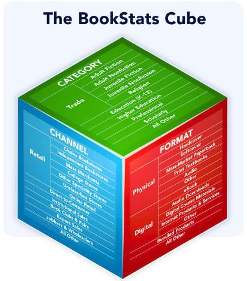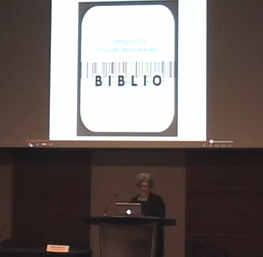 When I first began work on The Canadian Book Consumer reports I was overwhelmed by the data. The first week is a blur of Excel spreadsheets and percentages, mixed in with feelings of trepidation and uncertainty. But as I continued I discovered that there were distinct patterns in the data, particularly when I was tasked with creating consumer profiles based on genre preferences.
When I first began work on The Canadian Book Consumer reports I was overwhelmed by the data. The first week is a blur of Excel spreadsheets and percentages, mixed in with feelings of trepidation and uncertainty. But as I continued I discovered that there were distinct patterns in the data, particularly when I was tasked with creating consumer profiles based on genre preferences.
Data and Wisdom at MIP 2013
 The tenth annual Making Information Pay (MIP) conference ran under the banner “Data. Information. Knowledge. Wisdom.” This annual, half-day conference from the Book Industry Study Group encouraged attendees to use data to make business decisions, a notion that BookNet firmly believes in and advocates.
The tenth annual Making Information Pay (MIP) conference ran under the banner “Data. Information. Knowledge. Wisdom.” This annual, half-day conference from the Book Industry Study Group encouraged attendees to use data to make business decisions, a notion that BookNet firmly believes in and advocates.
Google Trends and Top Charts
Google Trends today launched Top Charts, a monthly view (US-only for the time being) of the top searches on Google, broken down by some broad categories—like books, cars, athletes, and many more. Here’s what might be of interest to bookish folk.
Canadian Book Consumer 2012
Canadian Book Consumer 2012 - An infographic by the team at BookNet Canada
Embed this infographic using the code below:
<img src="/storage/research-education/BookNet%20CBC%202012%20Infographic.jpeg?__SQUARESPACE_CACHEVERSION=1384784845674" width="540"> <p>Canadian Book Consumer 2012 - An infographic by the team at <a href="/consumer-studies/">BookNet Canada</a></p>
#CMPTO Wrap Up: Start Your Engines!
What Does It Mean to Implement ONIX 3.0?
![]() It’s a vexing question. I like to explain ONIX for Books by separating out the standard (what you track as metadata) from the technical side (XML, which can be thankfully ignored in this post). ONIX as a standard is a way for two companies to exchange information about books without ambiguity by using published definitions. Using the standard involves those companies agreeing between them on what level of detail they need from the ONIX data fields to support their systems and sales.
It’s a vexing question. I like to explain ONIX for Books by separating out the standard (what you track as metadata) from the technical side (XML, which can be thankfully ignored in this post). ONIX as a standard is a way for two companies to exchange information about books without ambiguity by using published definitions. Using the standard involves those companies agreeing between them on what level of detail they need from the ONIX data fields to support their systems and sales.
CMPTO: Start Your Engines!
Spotlight: BiblioCommons
 The technology behind library ebook distribution can be challenging for librarians and patrons alike.
The technology behind library ebook distribution can be challenging for librarians and patrons alike.
Beth Jefferson, the co-founder and CEO of library-focused tech startup BiblioCommons, discusses the opportunities and challenges of public library ebook distribution, and suggests ways that libraries can improve user experience, increase discoverability of a wider range of titles, and even—wait for it—sell books to library patrons.
Hey Girl, Learn Sales Analysis
 Publishers have access to a huge amount of data about their titles, but knowing how best to use that data to give your business a competitive edge can be tricky.
Publishers have access to a huge amount of data about their titles, but knowing how best to use that data to give your business a competitive edge can be tricky.
Erin Creasey is the sales and marketing director for ECW Press, one of Canada’s largest independents, where she has access to data from sources including SalesData, BookScan, and traditional and ebook retailers. “I’m always looking for the story behind the numbers,” she says.
Considering Paywalls
 Publishers and retailers are exploring new ways to package and price digital book content and we can learn quite a bit about this by looking to other content industries. We’re talking more frequently about bundling and subscriptions, but there’s a little less chatter about paywalls and I think that’s because the jury is still out on whether it works for our counter parts in newspapers and magazines. But it’s worth examining now to stay on top and ahead of things.
Publishers and retailers are exploring new ways to package and price digital book content and we can learn quite a bit about this by looking to other content industries. We’re talking more frequently about bundling and subscriptions, but there’s a little less chatter about paywalls and I think that’s because the jury is still out on whether it works for our counter parts in newspapers and magazines. But it’s worth examining now to stay on top and ahead of things.





